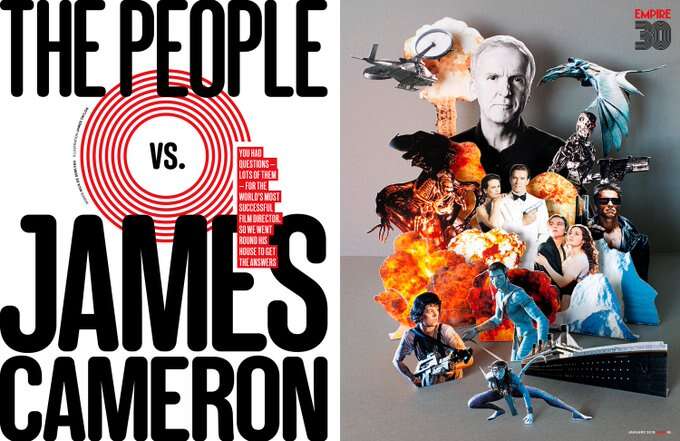
The editor of film magazine Empire has said she “firmly believes” the title will always exist in print as it celebrates its 30th anniversary.
Terri White told Press Gazette her magazine is “the world’s greatest gang for film fans and fundamentally that’s what every magazine should be – an amazing gang for your audience”.
She said diversifying into podcasting and events has helped the brand stay “really robust” in the face of digital disruption and changing reader habits.
To celebrate its milestone, Bauer Media’s flagship magazine has printed 30 covers for its next issue, celebrating one iconic film in every year since it launched in July 1989. All 30 covers can be viewed in Press Gazette’s gallery.
White, former editor of Time Out New York, said: “This is a moment to pause and reflect on what an incredible 30 years Empire had but also what an incredible 30 years cinema has had,”
‘Incredible’ subscriber base
According to White, who has edited Empire since September 2015 and been a reader since she was at university, the brand now reaches 4m people across print, online, social media, podcasts and events.
Although the print magazine’s average circulation has fallen 36 per cent to 93,038 in the past five years, subscriptions have fallen only slightly in that time, remaining at about 55,000.
White said Empire sees an uplift on the newsstand once a quarter when bagged with TV magazine Pilot, which launched last year as a standalone title but which is now only sold along with its sister title.
Empire’s “incredible” subscriber base, and the fact that specialist magazines “have proven to be a little bit more robust” leads White to say she “firmly believes there will always be a print magazine with Empire”.
“I think that’s because our readers are fans and when somebody is a fan they will spend £4.99 on a magazine, they will listen to a 90-minute podcast, they will pay £15 to come to a live event, because you are their gang, you are their people and that’s what Empire is,” she said.
“When you are gathering around a passion subject whether it’s film, whether it’s music, whether it’s fishing, I think once you have that at the heart and that’s your unifying thing, that makes it easier in many respects to keep the audience with you for a longer time and for you to have a purpose in the media landscape.
“I think Empire clearly still has a purpose in the media landscape.”
‘Aggressive’ early foray into audio pays off
Nonetheless, Empire has made sure to diversify into other mediums and concentrate on growing the brand’s total reach.
“Any brand that just sees itself as a print magazine these days will automatically not have a long-term future,” according to White. “You have to be where the consumer is and where the audience has shifted to.”
White pointed to how “early and aggressively” Empire moved into audio about seven years ago with its podcasts, which have become one of the most successful parts of the brand and enabled it to move into live events.
And the Empire podcast is LIVE at the #glasgowfilmfestival #bangilybang pic.twitter.com/pxqXYD2RGS
— Empire (@empiremagazine) March 3, 2019
The weekly podcasts hosted by associate editor Chris Hewitt routinely reach about 75,000 downloads, White said, while the more infrequent “spoiler specials” linked to the biggest movie releases usually get more than 100,000 downloads.
The biggest ever was the spoiler special for Avengers: Infinity War last year which was downloaded 500,000 times.
“That is insane,” said White. “That is a huge volume of people flooding into the Empire brand and the job then is to obviously try and engage them in as many platforms as possible.
“It’s become a really core part of the brand and that’s part of what’s enabled us to become what I think is a truly modern media brand as opposed to a legacy print mag with some other stuff attached.”
‘Silly’ to give mag content away online
Empire’s podcast and digital audiences are still growing. “That is a really important and exciting part of Empire’s future but print will always be a part of our brand,” said White.
Empire has focused on news and reviews on its website, keeping much of its print content exclusive to the magazine.
“We are a £4.99 magazine, [giving content away] would be silly,” White said.
“But also more than that it’s about knowing what each platform does. The content we create for print is crafted and carved for print media which means you set the rhythm, you set the pace, you design it in a different way, you take the reader through in a different way.
“The experience they have in print is complementary but different to what they have in digital.”
Earlier this year, Titanic director James Cameron took part in an exclusive in-depth interview about his new Avatar movie for the Empire podcast, filmed a video quiz about his movies, and written a magazine piece about his passion for filmmaking.

One of the James Cameron features in the January 2019 issue of Empire, kicking off the magazine’s 30th anniversary celebrations
“We took the time that we were given with him to make amazing content and we carved out the four or five ideas we wanted to do, one for each platform,” White said.
“It’s about understanding what your audience wants on each platform and how can you use the content and the time you have to craft a proper 360-degree offering.”
Industry challenges
White’s own career has seen her work in a number of men’s magazine titles. From associate editor at lads’ magazine Nuts she went on to deputy edit Maxim, then edit free weekly Shortlist.
Asked if some of the magazines that have closed over the past five years were not hot enough with their own “360-degree” approach, White said: “I don’t think it’s that simple”.
The closure of FHM and Zoo in 2015 marked the end of the lads’ mag era, which White attributed to the fact “those magazines simply would not exist today” because of cultural changes and the fact so much of their material is now available for free online.
“Certain markets will have more longevity than others,” White said.
Last year music magazine NME went online-only and then Shortlist closed to concentrate resources on sister title Stylist.
White said her former magazine had a “modern vision” under its last editor Joe Mackertich but that rising paper prices and falling advertising revenues meant there was no sustainable business model left.
“I think Shortlist was probably the best men’s magazine that’s ever existed in this country, but there were certain market forces and costs attached in terms of spiralling paper prices that made a future for that brand impossible.
“That had nothing to do with content, it had nothing to do with their ability to pivot between platforms but had everything to do with external forces. So I think certain markets have had a harder time.”
Picture: Empire
Email pged@pressgazette.co.uk to point out mistakes, provide story tips or send in a letter for publication on our "Letters Page" blog
